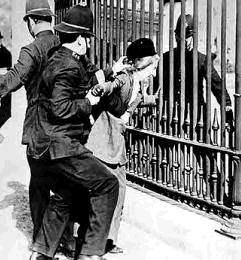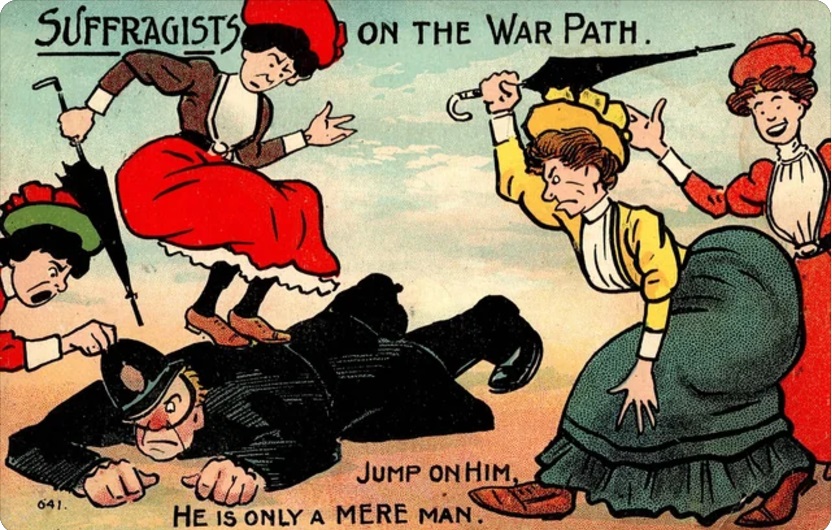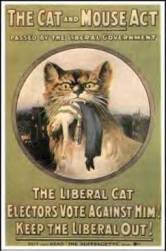|
|
|
|
Many men opposed women's suffrage - in 1875, a Committee for Maintaining the Integrity of the Franchise had been formed in Parliament. But many women opposed it too, for many reasons (see Sources A, B, C, G, the Cartoonists' view and Why did people oppose Women's Suffrage). In 1908 the Women’s National Anti-Suffrage League was formed.
Source AWoman, as mother, sweetheart, inspirer and friend, man accepts and welcomes. But once she begins to invade his province, to do his work – then his latent jealousy will burst into flame, and everywhere there will be a great revolt. Anti-Suffrage Review (January 1910).
Source BI regard women as superior and I don’t like to see them trying to become men’s equal. Violet Markham, speaking in October 1910.
Source CI am satisfied with my present position, and of my almost unlimited power of usefulness, that I have no need of a vote, and should not use it if I had it. Edith Milner, writing in The Times, 29 October 1906.
|
Going DeeperThe following links will help you widen your knowledge: Why did people oppose Women's Suffrage?
Why the campaign failed before 1914 - Sean Lang Communist essay - difficult and dull, but a good overview
Source Documents Samuel Evans' comments in the 1906 Parliamentary debate Did the Suffragettes help the cause of women's suffrage? - debate |
ProblemsPrivate member’s bills were presented every year after 1900. They were either talked out, or passed to a Committee of the Whole House, where nothing was decided. In 1904 MPs talked for hours about tail-lights on cars, so that there would not be time for the next Bill – on women’s suffrage. By 1908, however, most MPs, including most of the Cabinet, openly supported women’s suffrage. Asquith, the Prime Minister (who, however, did NOT agree with women’s suffrage) said that the government would bring a Bill to Parliament. In 1910 and 1911, therefore, Conciliation Bills (so-called because they only asked for the vote for one million women, so as not to annoy the opposition) were passed with large majorities. But the Bills did not become law – they were again passed to a Committee of the Whole House. The campaign for women’s suffrage got bogged down in politics. Some MPs opposed the Conciliation Bills because they did not want ANY women to get the vote. Some pro-suffrage MPs opposed the Bills because they were too narrow. Many Liberals opposed the Bills because they thought the 1 million rich women who would get the vote would vote Conservative. After 1910, the government was faced by other crises (especially trouble in Ireland) and many MPs thought there were more important things to worry about. Many Irish MPs (there were 100 of them) voted against the Bills because they wanted more time for the Irish Question. The Suffragettes’ reaction was to increase the violence (Source D). They burned down churches and bombed Lloyd George’s house. When arrested, they went on Hunger Strike (Source E). Emily Davison threw herself under the king’s horse and was killed (1913). If anything, there is an argument that the Suffragettes’ action turned people against Women's Suffrage (e.g. Sources F and G).
Source G
This cartoon of 1907 (artist unknown, but almost certainly a man) stereotypes Suffragettes as bitter old crones engaged in a gender-war against men.
|
Source DWe have tried every way, but we have had contempt poured upon us. Violence is the only way that we have to get the power that every citizen should have. Emmeline Pankhurst, speaking in 1912.
Source E
If Suffragettes went on hunger-strike, when they were very ill, the government released them. Then, when they had eaten and recovered, they were arrested again. This Act (1913) was nicknamed the ‘Cat and Mouse Act’.
Source FHaven’t the Suffragettes the sense to see that the very worst way of campaigning for the vote is to try and intimidate a man into giving them what he would gladly give otherwise? Lloyd George, speaking in 1913.
|
|
When a third Conciliation Bill was debated in the Commons in 1912, it lost by a majority of 14 votes. Then, in 1914, the First World War started, and the women’s leaders promised to stop campaigning for the vote and to help the war.
Source HAn argument against votes for women from the 1912 Parliamentary Debate Women do not have the experience to be able to vote. But there are other problems as well: the way women have been educated, their lack of strength, and the duties they have. If women did gain the vote, it would mean that most voters would then be women. What would be the effect of this on the government? I agree that there are some issues upon which the votes of women might be helpful. But these cases do not cover the whole of political life. What is the good of talking about the equality of the sexes? The first whiz of the bullet, the first boom of the cannon and where is the equality of the sexes then? From a speech made in 1912 by Lord Curzon, a Conservative leader.
|
Consider:1. Read the information on this webpage and list all the reasons you can suggest why women did not get the vote before 1914. 2. Look at the cartoons; what reasons can you infer why women did not get the vote before 1914? 3. If women were to get the vote, it would be given them by Parliament. Read the statements of those who spoke AGAINST the Conciliation Bill of 1912. What reasons did they give why they were against it?
|
|
| |


